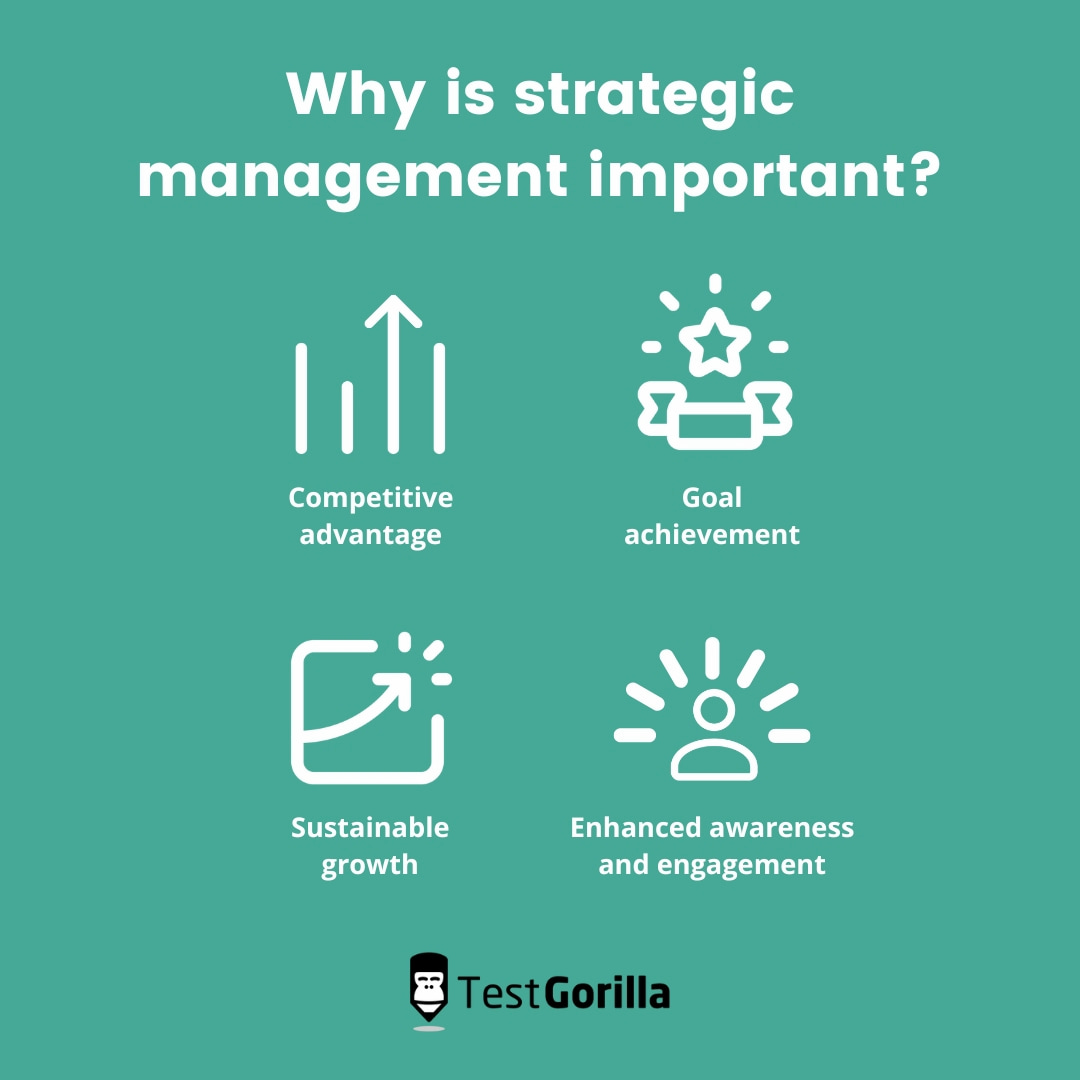Only companies with innovative ideas and growth strategies can thrive in the rapidly changing global business community. As such, ensuring success in any organizational process requires the expert input of a strategic manager.
These professionals specialize in overseeing a company’s management processes through to completion. However, you must look out for specific strategic skills when selecting a candidate for this role.
In this article, we’ll explain strategic management and explore five strategic skills that every manager needs. Finally, we’ll discuss how our Content Strategy test and Branding Strategy test can enhance your hiring process.
What is strategic management?
Strategic management is a process that involves handling a company’s resources to achieve its operational and financial goals. It involves considering several factors, determining how they can affect the company, and deciding on the steps to take.
It requires adept planning to create visions and critical-thinking skills to execute business goals. Big and small organizations alike use strategic management techniques like setting goals, assessing competitors, and reviewing internal processes to ensure their effectiveness.
Why is strategic management important?
Organizational strategy cuts across internal and external elements that determine a company’s success. Effective strategic planning processes can enable you to achieve goals in a sustainable way.
Below are four major reasons for implementing strategic management processes in your organization:
1. Competitive advantage
The main purpose of strategic management is to give you an edge over your competitors. In addition, monitoring competitors’ activities can encourage employees to be more productive.
2. Goal achievement
Strategic management can help your company attain its goals by developing and executing new strategies. It’s also handy if your business is struggling to focus on specific goals.
3. Sustainable growth
Any business that aims to grow or maintain its growth must attain the goals set by its management. Strategic management techniques can help increase performance and lead to sustainable growth and development.
4. Enhanced awareness and engagement
Through strategic management, you can learn more about your organization and discover internal and external variables you can change to use resources more efficiently.
The best insights on HR and recruitment, delivered to your inbox.
Biweekly updates. No spam. Unsubscribe any time.
5 skills that make a manager a good strategist
Though most organizations have managers to oversee their activities, what separates good managers from great ones is their strategic abilities. Here are five strategic skills that you can look out for when hiring a manager:
1. An analytical and conceptual mindset
Creating systematic strategies requires strong analytical skills that enable you to devise viable solutions to a task. Analytical skills involve evaluating and understanding business scenarios, the competitive landscape, marketing insights, and overall company objectives.
Managers with strong analytical skills can review evidence from several sources to determine a strategic course to follow. But note that strategic planning doesn’t just involve logical thinking alone.
Forming the most effective strategic plans also requires you to take a creative approach. Applying creative thinking during analysis can help you discover ideas that logic alone might miss. According to the Harvard Business Review, a great strategy requires creativity.
2. Curiosity
The foundation of any strategy is gaining a deep understanding by investigating and asking questions. In this light, the best strategists aren’t just curious about the “who,” “what,” “where,” “when,” and “how” of a given situation or challenge.
They also seek to understand the “why” – the reasons, motivations, and causes of such occurrences or problems. For example, they may look into why consumers think and act in a specific manner or why their organization is falling behind competitors in the market.
An almost obsessive curiosity forms the crux of good strategic management and planning. Without the insights gained from such a curious approach, your business may suffer from losses or underdevelopment and eventually lose its competitive edge.
This is why a strategist’s job is never complete, even after they sign off on the strategy. The continuous evolution of brands, clients, and the environment makes it vital to frequently review and re-evaluate even the best strategies.
3. Discernment and attention to detail
Strategic management and planning often require managers to spend a lot of time on a project’s details. This may involve researching, examining gathered facts or evidence, and compiling a proposal for strategic development.
Finding the thin line between drafting an excellent, watertight strategy and an overly complicated, bloated strategy may not be easy. The real value of strategic thinking lies in the ability to determine the project’s necessities accurately.
The best strategists are discerning and have strong attention to detail that enables them to make concise and relevant decisions.
4. Adaptability
Another vital skill that makes a manager a good strategist is the ability to adapt to different professional roles and situations. Managers often deal with clients and customers from different spheres and must familiarize themselves with other people’s companies and needs.
For example, an adaptable manager might show a client that they can also provide excellent marketing services in addition to the service they are currently providing them of supplying goods. The best strategists know how to adapt to any job environment they may be in.
Interestingly, according to a Harvard Business School survey, 71% of 1,500 executives from more than 90 countries said adaptability was the most important quality in a leader.
Adaptable managers can work independently, under an agent, or as permanent employees in an organization.
Adaptability also involves using empathy and imagination to step out of your comfort zone.
This involves putting yourself in the shoes of a client or consumer to develop a fresh perspective on consumer behavior. An excellent strategist can easily switch between different brand categories and styles. These specialists are especially well suited to the managerial role in your organization.
5. Courage
Skillful strategists are also courageous in their convictions and can sell ideas in an engaging way. It’s often scary to present a strategy to a board and face possible rejection.
Therefore, managers must have the courage to present their ideas passionately and show the merits of their strategy. Although this skill may come easier to some based on their personality, anyone can learn, refine, and master it through experience and hard work.
Assess strategic skills in candidates with TestGorilla
You need an accurate and efficient way to evaluate strategic management skills since you can’t rely solely on the credentials that applicants have written in their resumes or cover letters. Your best bet is to assess candidates using cognitive ability tests.
With TestGorilla’s Content Strategy test and Market Strategy test, you can hire managers who are experts in strategic thinking and will help you achieve business targets and marketing goals. They also enable you to evaluate a candidate’s ability to define, manage, and develop your brand.
When hiring for a crucial role like a managerial position, you must ensure your candidates can satisfy your business needs. Learn more about our tests with a free 30-minute demo.
Sign up today to get started for free.
Related posts
You've scrolled this far
Why not try TestGorilla for free, and see what happens when you put skills first.




















